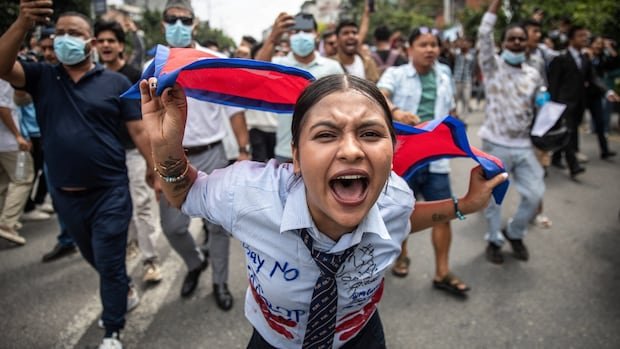A whirlwind 48-hour period unfolded in Nepal’s capital, Kathmandu, as thousands of young individuals took to the streets in protest. The upheaval culminated in government buildings being set ablaze, leading to the ousting of the country’s prime minister.
The rapid overthrow of Nepal’s ruling government by the younger generation, facilitated through platforms like TikTok and Discord for coordination, has left many activists astounded. Tanuja Pandey, a 25-year-old lawyer and environmental advocate involved in the protests, described the turn of events as unexpected and emotionally taxing due to the loss of friends.
The demonstrations resulted in 74 fatalities, including protesters, police officers, and inmates attempting to escape custody amid the chaos. Subsequently, a new interim prime minister has been appointed, an election scheduled for early next year, and a judicial commission formed to investigate the violence during the government’s collapse.
Despite a sense of achievement in holding the government accountable, Pandey emphasized the necessity for change, citing a long-standing presence of familiar faces in power. Another protester, Sajan Shrestha, expressed optimism about reshaping the country’s future and dismantling the existing system to pave the way for a better nation.
The protests initially sparked due to a social media ban imposed by the government, but underlying the anti-corruption movement was a deep-seated resentment towards the disparity between the lifestyles of ordinary Nepalese youth and the privileged offspring of politicians. The outcry against “nepo kids” highlighted instances of extravagant displays by the ruling elite’s children, contrasting with the struggles faced by many young Nepalese in a nation plagued by poverty and political instability.
Utilizing hashtags such as #nepokids and #nepobabies, videos circulated rapidly on social media platforms like TikTok, Instagram, and Reddit. While TikTok played a crucial role in mobilizing protesters, Discord emerged as a central platform for deliberating on the country’s interim leadership, ultimately leading to the selection of Sushila Karki, a respected former chief justice.
The wave of protests in Nepal echoes similar movements across South Asia in recent years, indicating a trend of younger generations challenging entrenched systems marred by cronyism, corruption, and limited economic prospects. As Nepal transitions towards elections in March, the focus shifts to sustaining momentum for lasting social change, amidst concerns of political instability and the need for genuine reform.

